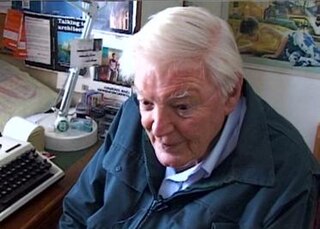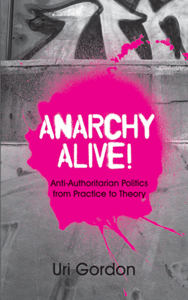Anarchism is a political philosophy and movement that is skeptical of all justifications for authority and seeks to abolish the institutions it claims maintain unnecessary coercion and hierarchy, typically including nation-states, and capitalism. Anarchism advocates for the replacement of the state with stateless societies and voluntary free associations. As a historically left-wing movement, this reading of anarchism is placed on the farthest left of the political spectrum, usually described as the libertarian wing of the socialist movement.
Libertarian socialism is an anti-authoritarian and anti-capitalist political current that emphasises self-governance and workers' self-management. It is contrasted from other forms of socialism by its rejection of state ownership and from other forms of libertarianism by its rejection of private property. Broadly defined, it includes schools of both anarchism and Marxism, as well as other tendencies that oppose the state and capitalism.

Colin Ward was a British anarchist writer and editor. He has been called "one of the greatest anarchist thinkers of the past half century, and a pioneering social historian."
Anarcho-pacifism, also referred to as anarchist pacifism and pacifist anarchism, is an anarchist school of thought that advocates for the use of peaceful, non-violent forms of resistance in the struggle for social change. Anarcho-pacifism rejects the principle of violence which is seen as a form of power and therefore as contradictory to key anarchist ideals such as the rejection of hierarchy and dominance. Many anarcho-pacifists are also Christian anarchists, who reject war and the use of violence.
CrimethInc., also known as CWC, which stands for either "CrimethInc. Ex-Workers Collective" or "CrimethInc Ex-Workers Ex-Collective", is a decentralized anarchist collective of autonomous cells. CrimethInc. emerged in the mid-1990s, initially as the hardcore zine Inside Front, and began operating as a collective in 1996. It has since published widely read articles and zines for the anarchist movement and distributed posters and books of its own publication.

Anarchists Against the Wall (AAtW), sometimes called "Anarchists Against Fences" or "Jews Against Ghettos", is a direct action group composed of Israeli anarchists and anti-authoritarians who opposed the construction of the Gaza–Israel barrier and Israeli West Bank barrier.
The nature of capitalism is criticized by left-wing anarchists, who reject hierarchy and advocate stateless societies based on non-hierarchical voluntary associations. Anarchism is generally defined as the libertarian philosophy which holds the state to be undesirable, unnecessary and harmful as well as opposing authoritarianism, illegitimate authority and hierarchical organization in the conduct of human relations. Capitalism is generally considered by scholars to be an economic system that includes private ownership of the means of production, creation of goods or services for profit or income, the accumulation of capital, competitive markets, voluntary exchange and wage labor, which have generally been opposed by most anarchists historically. Since capitalism is variously defined by sources and there is no general consensus among scholars on the definition nor on how the term should be used as a historical category, the designation is applied to a variety of historical cases, varying in time, geography, politics and culture.
Anarchism is generally defined as the political philosophy which holds the state to be undesirable, unnecessary and harmful as well as opposing authority and hierarchical organization in the conduct of human relations. Proponents of anarchism, known as anarchists, advocate stateless societies based on non-hierarchical voluntary associations. While anarchism holds the state to be undesirable, unnecessary and harmful, opposition to the state is not its central or sole definition. Anarchism can entail opposing authority or hierarchy in the conduct of all human relations.
Prefigurative politics are the modes of organization and social relationships that strive to reflect the future society being sought by the group. According to Carl Boggs, who coined the term, the desire is to embody "within the ongoing political practice of a movement [...] those forms of social relations, decision-making, culture, and human experience that are the ultimate goal". Besides this definition, Leach also gave light to the definition of the concept stating that the term "refers to a political orientation based on the premise that the ends a social movement achieves are fundamentally shaped by the means it employs, and that movement should therefore do their best to choose means that embody or prefigure the kind of society they want to bring about". Prefigurativism is the attempt to enact prefigurative politics.
The following is a list of terms specific to anarchists. Anarchism is a political and social movement which advocates voluntary association in opposition to authoritarianism and hierarchy.
Contemporary anarchism within the history of anarchism is the period of the anarchist movement continuing from the end of World War II and into the present. Since the last third of the 20th century, anarchists have been involved in anti-globalisation, peace, squatter and student protest movements. Anarchists have participated in armed revolutions such as in those that created the Makhnovshchina and Revolutionary Catalonia, and anarchist political organizations such as the International Workers' Association and the Industrial Workers of the World have existed since the 20th century. Within contemporary anarchism, the anti-capitalism of classical anarchism has remained prominent.
"The Tyranny of Structurelessness" is an essay by American feminist Jo Freeman that concerns power relations within radical feminist collectives. The essay, inspired by Freeman's experiences in a 1960s women's liberation group, reflected on the feminist movement's experiments in resisting leadership hierarchy and structured division of labor. This lack of structure, Freeman writes, disguised an informal, unacknowledged, and unaccountable leadership, and in this way ensured its malefaction by denying its existence. As a solution, Freeman suggests formalizing the existing hierarchies in the group and subjecting them to democratic control.

Total liberation, also referred to as total liberation ecology or veganarchism, is a political philosophy and movement that combines anarchism with a commitment to animal and earth liberation. Whilst more traditional approaches to anarchism have often focused primarily on opposing the state and capitalism, total liberation is additionally concerned with opposing all additional forms of human oppression as well as the oppression of other animals and ecosystems. Proponents of total liberation typically espouse a holistic and intersectional approach aimed at using direct action to dismantle all forms of domination and hierarchy, common examples of which include the state, capitalism, patriarchy, racism, heterosexism, cissexism, disablism, ageism, speciesism and ecological domination.
Anarchy is a form of society without rulers. It is primarily advocated by anarchists who propose replacing the state with a stateless society based on voluntary free association. These institutions or free associations are generally modeled to represent concepts such as community and economic self-reliance, interdependence, or individualism. In simple terms anarchy means 'without rulers' or 'without authority'. As such, under anarchy there is no coercive rule by a single group or individual, rather instead by an individual upon themselves or by the people entirely.
Insurrectionary anarchism is a revolutionary theory and tendency within the anarchist movement that emphasizes insurrection as a revolutionary practice. It is critical of formal organizations such as labor unions and federations that are based on a political program and periodic congresses. Instead, insurrectionary anarchists advocate informal organization and small affinity group based organization. Insurrectionary anarchists put value in attack, permanent class conflict and a refusal to negotiate or compromise with class enemies.
A classless society is a society in which no one is born into a social class like in a class society. Distinctions of wealth, income, education, culture, or social network might arise and would only be determined by individual experience and achievement in such a society. Thus, the concept posits not the absence of a social hierarchy but the uninheritability of class status. Helen Codere defines social class as a segment of the community, the members of which show a common social position in a hierarchical ranking. Codere suggest that a true class-organized society is one in which the hierarchy of prestige and social status is divisible into groups. Each group with its own social, economic, attitudinal and cultural characteristics, and each having differential degrees of power in community decision.

Rebel Alliances: The Means and Ends of Contemporary British Anarchisms is a book-length study of philosophy applied to contemporary British class-struggle anarchism. Philosopher Benjamin Franks compares this tradition with competing political groups such as autonomist Marxism and describes a consistent, "ideal" anarchism.
Anarchism and libertarianism, as broad political ideologies with manifold historical and contemporary meanings, have contested definitions. Their adherents have a pluralistic and overlapping tradition that makes precise definition of the political ideology difficult or impossible, compounded by a lack of common features, differing priorities of subgroups, lack of academic acceptance, and contentious historical usage.





